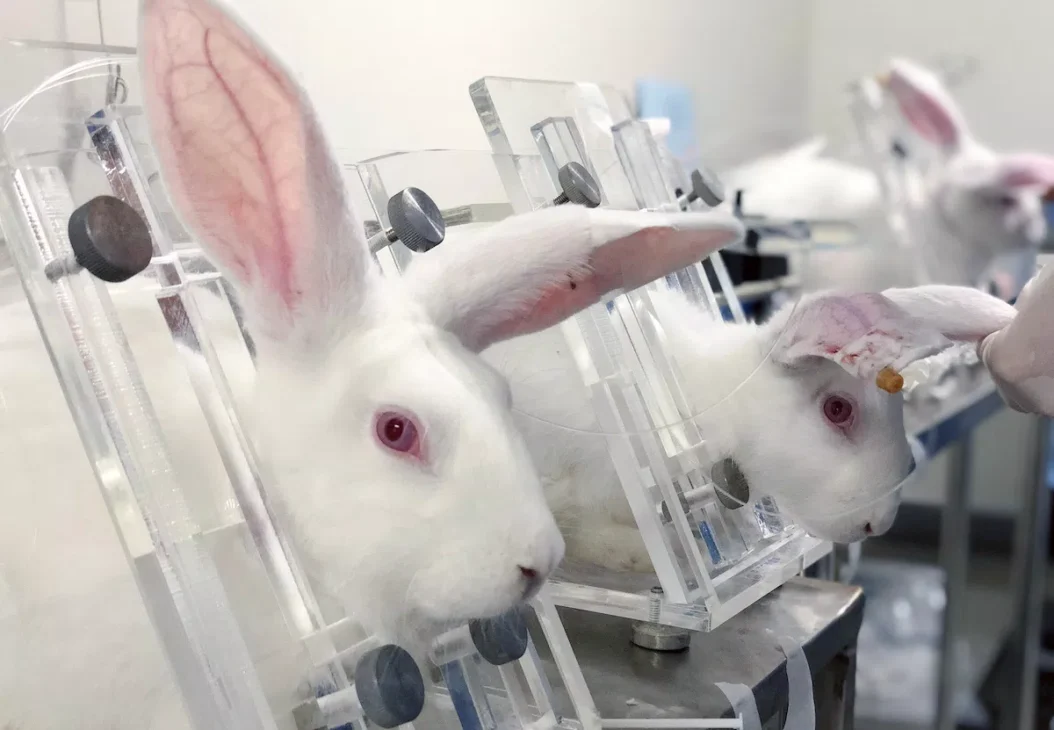The enactment of the FDA Modernization Act 2.0, poised for final action in the U.S. House of Representatives, will be a boon for animals, liberating scientists and regulators to employ 21st-century testing methods to screen new drugs and sparing animals needlessly conscripted into an outdated and expensive testing scheme with its origins in the Depression era.
The amount of animal use in drug development is colossal, largely concealed from public gaze and far eclipsing the numbers of animal victims put through torments in cosmetic, chemical, pesticide, and other forms of safety and efficacy screening. There are 59,000 dogs used every year in lab experiments in the United States, mainly for drug testing. Add in 68,000 primates. And then add in another one million animals, from rabbits to guinea pigs to mice and rats. And that’s just in the United States. Add in millions more for a global pharmaceutical sector that spans dozens of countries and several continents.
While the recent release and mass adoption of beagles at a contract breeding facility supplying drug developers drew important attention to the larger problem, it is not expected in the end to reduce the number of dogs used in mandatory-testing programs. Halting beagle production at one facility will just increase breeding levels at others. Because of the federal government’s testing requirement, demand for beagles is inelastic.
The only pathway for systemic change is passing the FDA Modernization Act 2.0. That bill, led by Sens. Rand Paul, R-Ky., and Cory Booker, D-N.J., passed the Senate at the end of September. It eliminates a mandate for animal testing for all new drug development protocols. When the FDA accepts non-animal testing data, we will see thousands of beagles spared and no corresponding surge in the use of other animals elsewhere. We’ll see an across-the-board reduction in the use of dogs, primates, rabbits, mice, and other creatures.
A companion bill, H.R. 2565, led by Reps. Vern Buchanan, R-Fla., and Elaine Luria, D-Virg., has 60 Democrats and 45 Republicans as House cosponsors. If Democrat leaders want change on this front, they can bring up S. 5002 and pass it, probably without any dissent. From there, it would go to President Joe Biden for his signature.
Animal Testing Woefully Inadequate in Forecasting Human Reactions to Drugs
“Right now, the tools available to pharma … make it exceedingly difficult, if not impossible, to develop rare disease drugs,” Isaac Bentwich M.D., the founder and CEO of the biotech company Quris, wrote last week. “The economics of drug development tell a good part of the story. It costs $2.5 billion and 12 to 18 years, on average, to develop a new drug. In the rare disease space, where there is a smaller number of patients, those numbers are simply unsustainable.”
In short, because the capital costs are so stratospheric for new drugs — mainly because the animal tests drag out the drug approval process for years and rack up the expenses — drug developers typically cannot afford to seek palliatives and cures for rarer diseases. They go for the home-run treatments with the potential to penetrate a market with millions of patients. That leaves other patients without much hope or help, unable to address a type of disease that may affect thousands or even tens of thousands of Americans.
Like so many other companies in the sector, Quris is backing the FDA Modernization Act because it will allow the use of innovative methods that will be game-changing in drug development, lowering the barrier to pursue a wide range of treatments and cures. The company, for example, has developed Artificial Intelligence-powered miniaturized “patients-on-a-chip” as a non-animal testing method. With this tool, the company has developed a treatment for Fragile-X Syndrome, the most common inherited cause of intellectual and developmental disabilities worldwide.
Until the FDA Modernization Act is signed into law, though, requirements for animal testing are still in place, meaning that drug developers must run costly and time-consuming animal tests in parallel with the more effective test methods.
As a general proposition, non-animal test methods, grounded on human biology, will often better forecast human reactions to drugs. While we know that dogs and primates feel pain and fear like humans do, bitter experience and reams of data tell us that dogs and other mammals are not good subjects for modeling human disease. An analysis of the most comprehensive quantitative database of publicly available animal toxicity studies suggests that drugs that pass muster in animal tests fail in human clinical trials 90-to-95% of the time.
When a drug fails to gain approval for marketing, the company bears the cost of failure, which can be $1 billion or more. That means that any drug gaining approval must generate enough revenue to pay for the failures.
“If a company experiences 5 or 10 failures before developing a successful drug, the cost of those failures drives the cost of drug development even higher,” added Bentwich. “If the industry had the ability to take only successful drugs through the drug development and clinical testing process, development costs could be reduced.”
The FDA Modernization Act will be the catalyst for this transition to modern science. It has already passed the Senate without dissent, and now the House must move quickly to bring it to the House floor for vote.
As a nation, we are moving away from animal testing for scientific and moral reasons. Allowing for the use of modern tools for drug development will change the current drug development quagmire. The FDA Modernization Act will be a win for patients, drug developers and biotech, and millions of animals. It will usher in a new era of animal and human health and well-being.
We need your help to pass the FDA Modernization Act 2.0 in the U.S. House here.
